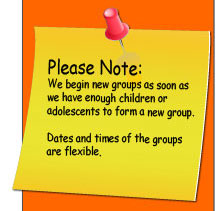| November 2014 - Volume 62 | |
| Helping Children and Adolescents Succeed Socially! | |
| The Social Skills Groups |
|
AttunementThis can help or hurt your child in many ways, including making and keeping friends. At the core of good parenting is attunement. Attunement is being aware of, and responsive to, another. How does your child feel? Are they happy or sad, interested, engaged, capable of listening? Are they in distress, hungry or just needing to be held? What is the best way to communicate to your child, whether something you notice in their behavior that is right or wrong, a feeling an idea…in any moment? What will engage, encourage and show them feelings of love and care? What will be heard, perceived, felt and learned — in short, what the parent will communicate — depends upon how receptive the child is. And how well a parent reads a child's receptivity depends upon an understanding of how humans communicate without words. Attunement has a lot to do with our abilities in non-verbal communication. In fact, most of our communication with our children and others is non-verbal and a large percentage of what our brains perceive in communication with others is non-verbal signals. Some examples of our day to day signals to our children or others may be the movement of your eye (a warm wink), facial gestures, (the opening of your mouth in surprise, a yawn) your tone of voice, the movement of your hand (a wave, or an A-OK) or the tip of your head. And most of the time we are unaware of any of our non-verbal gestures. We just do them. We even repeat our own parent’s non-verbal gestures to us. It is important to know your child can literally sense your interest and sincerity in them, as well your approval or disapproval in them. Attunement and attachment are related. Attachment is an emotional bond to another person. According to psychologist John Bowlby, the earliest bonds formed by children with their parents (caregivers) have an important impact that continues throughout their life. Attunement and attachment are related in that, mothers/fathers (caregivers) who are available and attuned to their child, in other words, responsive to their child’s needs beginning in infancy, establish a sense of security within that child. The infant/child learns that their parent (caregiver) is dependable. This attunement creates a strong foundation for which that child can explore the world. Research tells us and suggests that early attachments have a serious impact on later relationships in the lives of our children. Children who are securely attached in childhood tend to have good self-esteem, strong romantic relationships, and the ability to feel comfortable to share of themselves with others. Research also tells us that when children do not form secure attachments early in their lives, this can have a negative impact on their behavior in later childhood and throughout their lives. Attunement to another is vitally important. Throughout our lives it helps us to build and maintain our relationships to others. How can we be better at Attunement, in other words, at tuning into our infants and children?
Help your children identify how they feel. Attuning to them will help them know themselves. This will teach them to attune to others, helping them to establish nice relationships in their lives. This will help them to make and keep friends. Please notice your child and the good stuff they do. And pay less attention to their mistakes. This will promote more good behaviors and more nice feelings in them. Notice if they are tired, hungry, wet, cold, hot, feeling well or not feeling well. Notice if they are sad or if they are happy. Notice if they need a friend to play with. Help them invite a friend over. Give them rules to keep them safe and limits and boundaries to ‘hold” them, which in turn will help them to understand other people’s limits and boundaries. Support them in every way you can. Things you can say to them to show understanding:
Some ideas taken from, Dr. Bruce D. Perry, M.D., Ph.D. (Research Professor of Child Psychiatry, Department of Psychiatry and Behavioral Sciences, Baylor College of Medicine; and Chief of Psychiatry, Texas Children's Hospital, Houston, Texas.) |
| The Social Skills Place, Inc. :: 310 S. Happ Rd, Suite 201 :: Northfield, Illinois 60093 Office 847 446-7430 :: Cell 847 507-8834 :: www.socialskillsplace.com |
|
| (C) 2006-2021 :: All Rights Reserved :: Unsubscribe from our mailings |
